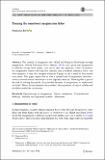Files in this item
Taming the runabout imagination ticket
Item metadata
| dc.contributor.author | Berto, Francesco | |
| dc.date.accessioned | 2018-09-04T10:30:13Z | |
| dc.date.available | 2018-09-04T10:30:13Z | |
| dc.date.issued | 2018-03-13 | |
| dc.identifier | 255688682 | |
| dc.identifier | 69657b85-f09a-4b31-af7f-788312c37231 | |
| dc.identifier | 85043688898 | |
| dc.identifier.citation | Berto , F 2018 , ' Taming the runabout imagination ticket ' , Synthese , vol. First Online . https://doi.org/10.1007/s11229-018-1751-6 | en |
| dc.identifier.issn | 0039-7857 | |
| dc.identifier.other | ORCID: /0000-0003-3246-657X/work/48132009 | |
| dc.identifier.uri | https://hdl.handle.net/10023/15952 | |
| dc.description | This research is published within the project ‘The Logic of Conceivability’, funded by the European Research Council (ERC CoG), Grant Number 681404. | en |
| dc.description.abstract | The ‘puzzle of imaginative use’ (Kind and Kung in Knowledge through imagination, Oxford University Press, Oxford, 2016) asks: given that imagination is arbitrary escape from reality, how can it have any epistemic value? In particular, imagination seems to be logically anarchic, like a runabout inference ticket: one who imagines A may also imagine whatever B pops to one’s mind by free mental association. This paper argues that at least a certain kind of imaginative exercise—reality-oriented mental simulation—is not logically anarchic. Showing this is part of the task of solving the puzzle. Six plausible features of imagination, so understood, are listed. Then a formal semantics is provided, whose patterns of logical validity and invalidity model the six features. | |
| dc.format.extent | 15 | |
| dc.format.extent | 322257 | |
| dc.language.iso | eng | |
| dc.relation.ispartof | Synthese | en |
| dc.rights | © The Author(s) 2018. Open Access. This article is distributed under the terms of the Creative Commons Attribution 4.0 International License (http://creativecommons.org/licenses/by/4.0/), which permits unrestricted use, distribution, and reproduction in any medium, provided you give appropriate credit to the original author(s) and the source, provide a link to the Creative Commons license, and indicate if changes were made. | en |
| dc.subject | Aboutness | en |
| dc.subject | Counterfactual thinking | en |
| dc.subject | Epistemology of imagination | en |
| dc.subject | Mental simulation | en |
| dc.subject | Variably strict epistemic modals | en |
| dc.subject | B Philosophy (General) | en |
| dc.subject | Philosophy | en |
| dc.subject | General Social Sciences | en |
| dc.subject | T-NDAS | en |
| dc.subject.lcc | B1 | en |
| dc.title | Taming the runabout imagination ticket | en |
| dc.type | Journal article | en |
| dc.contributor.institution | University of St Andrews.Philosophy | en |
| dc.identifier.doi | 10.1007/s11229-018-1751-6 | |
| dc.description.status | Peer reviewed | en |
This item appears in the following Collection(s)
Items in the St Andrews Research Repository are protected by copyright, with all rights reserved, unless otherwise indicated.

